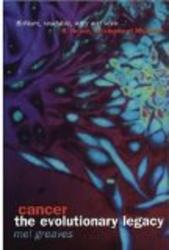Description
The author, Mel Greaves, argues that cancer can be understood through the lens of evolutionary biology. He discusses the history of cancer and how it has changed over time, as well as the various causes of cancer. He also discusses the implications of evolutionary biology for research into cancer, prevention, and treatment.
Every day, 1500 Americans die of cancer, and yet for most of us this deadly disease remains mysterious. Why is it so common? Why are there so many different causes? Why does treatment so often fail? What, ultimately, is cancer? In this fascinating new book, a leading cancer researcher offers general readers clear and convincing answers to these and many other questions. Mel Greaves places cancer in its evolutionary context, arguing that we can best answer the big questions about cancer by looking through a Darwinian lens. Drawing on both ancient and more modern evolutionary legacies, he shows how human development has changed the rules of evolutionary games, trapping us in a nature-nurture mismatch. Compelling examples, from the King of Naples intestinal tumor in the 15th century, through the epidemic of scrotal skin cancer in 18th-century chimney sweeps, to the current surge of cases of prostate cancer illustrate his thesis. He also shows why the old paradigms of infectious diseases or genetic disorders have proved fruitless when trying to explain this complex and elusive disease. And finally, he looks at the implications for research, prevention, and treatment of cancer that an evolutionary perspective provides. Drawing on the most recent research, this is the first book to put cancer in its evolutionary framework. At a time when Darwinian perspectives on everything from language acquisition to economics are providing new breakthroughs in understanding, medicine seems to have much to gain from the insights provided by evolutionary biology. Written in an exceptionally lucid and entertaining style, this book will be of broad interest to all those who wish to know more about this dread disease.
Nothing can scare us quite as much as cancer. This disease, striking sometimes sensibly, sometimes arbitrarily, inspires despair and hopelessness to the same extent that its cure eludes us. Cancer researcher Mel Greaves illuminates what we know of its causes and the obstacles to research in
Cancer: The Evolutionary Legacy. The subtitle is intriguing, and Greaves backs it up with a detailed examination of the evolutionary biology of cancer cells. It turns out that we can profitably think about cancer as a tool in the struggle for survival and reproduction among all the cells within a body. Losing regulatory genes might be great for reproducing individual cell lines, but in the long run, they are, of course, devastating to the organism as a whole. Greaves's personal, almost chatty style helps the nontechnical reader through some of the complicated immunological and genetic issues, and it also humanizes a topic that can easily overwhelm us with awe. Slipping back a few centuries, he explores the history of cancer and our attitudes toward it, then looks at how it has changed in recent years to become more widespread and better understood. Though Greaves is careful not to promise a cure just around the corner, his experience lends the writing an optimism that most readers will find refreshing. Though we're still at the mercy of this terrible disease, it's good to know we have more than just natural selection on our side.
--Rob Lightner
